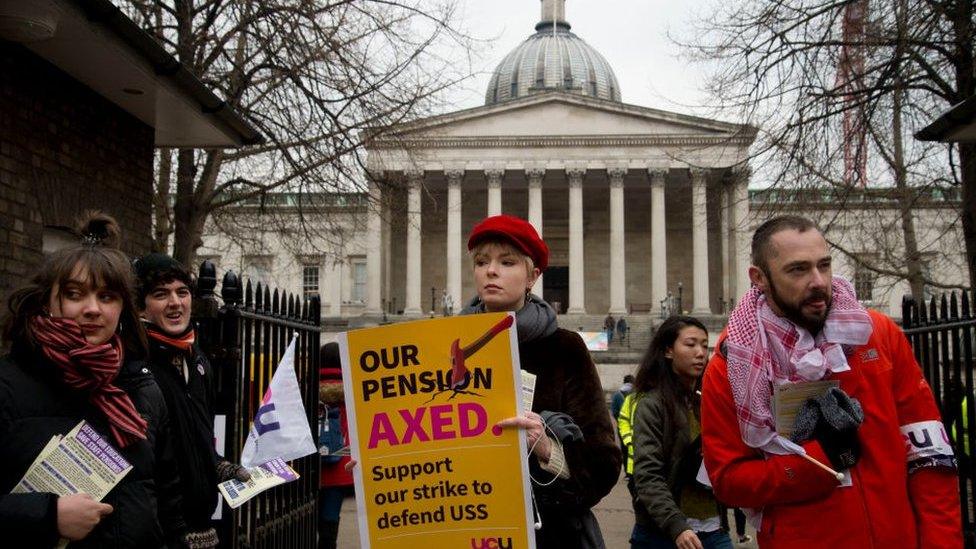University pensions deficit could be £23bn
- Published

University staff in the picket line outside University College London in February 2018
The pension scheme for university academics would face a deficit of £23bn if it had to be rescued by a government-backed pension lifeboat, the scheme's annual accounts show.
The figures will stoke a fierce debate about the Universities Superannuation Scheme's (USS) financial position.
It has assets of more than £60bn and provides retirement incomes and savings for about 200,000 UK university staff.
The USS said it funds the scheme in a "fair and balanced way".
In February and March 2018, academics at 64 universities took industrial action over plans by their employer Universities UK to reduce future benefits and introduce a less-generous pension arrangement.
The University and College Union said the new plans would leave them up to £10,000 a year worse off in retirement, and younger staff would be worst affected, with some losing up to half their pensions.
USS's accounts for the year to the end of March 2019, which were published last week, give several different figures for the size of the scheme deficit.
The "best estimate" for the scheme is a surplus of £5.2bn, which the accounts say "does not build in prudence and has a 50% chance of being more than is required to pay the benefits, and 50% of being too little".
The technical provisions estimate, which includes "prudence", is £7.5bn. The buyout deficit - arrived at by assuming that universities paid an insurance company like the Prudential to take the scheme off their hands and pay out all future benefits - is £63.9bn.
The accounts contain another estimate, which follows the standard rules laid down by the Pension Protection Fund (PPF), which is the backstop scheme for retirement plans that get into financial difficulty.

University staff and students attend a march for education in London in February 2018
In recent years, the PPF has taken on the schemes of companies such as MG Rover, BHS, Carillion and Hoover.
If the PPF took over the university scheme - which would see some academics receiving reduced payouts in retirement - the deficit would be £23.1bn.
The USS disagrees, however. A spokesman said: "Our focus is on funding the scheme in a balanced and responsible way that ensures members' pensions are secure.
"There has been intensive engagement to ensure the institutions in the scheme understand clearly, and are collectively able and willing to support, the levels of risk and volatility in the scheme.
"The PPF measure does not take into account the specifics of the scheme or the benefits of investing in a diverse range of assets."
John Ralfe, the independent pensions expert, said: "The hard PPF numbers show how huge USS's deficit is, and how it has ballooned."
Whistleblowing
In May, statistician Prof Jan Hutton, a USS trustee, told the Financial Times, external that she had been thwarted in her efforts to investigate whether the pensions deficit had been exaggerated to justify the cuts.
She claimed to have identified a calculation error in the "retirement rate" used to calculate the deficit in November 2017, and she took her concerns to the pensions regulator in March 2018.
USS had claimed to have a £7.5bn deficit in November 2017, which prompted Universities UK to put forward proposals to reduce future benefits and introduce a less-generous pension arrangement.

The Pension Protection Fund has had to step in to help with troubled retailer BHS, which closed down in 2016
Universities dropped plans to move from a defined-benefit scheme, which gives a guaranteed retirement income, to a defined-contribution scheme, where their pensions would be subject to the performance of the stock market.
However, defined benefit scheme members and universities have been asked to raise their contributions in order to fix the deficit.
Unhappy with this, Prof Hutton went public, and as a result of the press coverage, in June more than 1,000 academics signed an open letter calling for an urgent inquiry into the governance of the USS fund.
New ballots are planned for September. Universities have said union demands for extra contributions to the scheme could bankrupt some institutions, and severely curtail academic activity at others.
Additional reporting by Mary-Ann Russon
- Published13 March 2018

- Published9 May 2019
